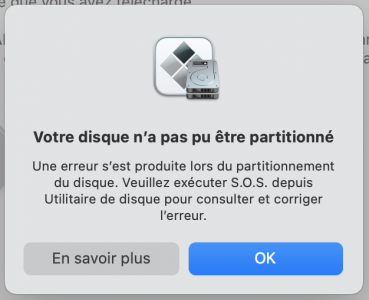Started APFS operation
Aligning shrink delta to 149 963 177 984 bytes and targeting a new physical store size of 349 999 996 928 bytes
Determined the minimum size for the targeted physical store of this APFS Container to be 241 692 573 696 bytes
Resizing APFS Container designated by APFS Container Reference disk1
The specific APFS Physical Store being resized is disk0s2
Verifying storage system
Using live mode
Performing fsck_apfs -n -x -l /dev/disk0s2
Checking the container superblock
Checking the EFI jumpstart record
Checking the space manager
Checking the space manager free queue trees
Checking the object map
Checking volume
Checking the APFS volume superblock
The volume Macintosh HD was formatted by storagekitd (1640.0.0.111.2) and last modified by apfs_kext (1677.60.23)
Checking the object map
Checking the snapshot metadata tree
Checking the snapshot metadata
Checking snapshot 1 of 1 (com.apple.os.update-5523D8E63431315F9F949CCDD0274BF797F5CEE4EAF616D4C66A01B8D6A83C7B)
Checking the extent ref tree
Checking the fsroot tree
Checking the file extent tree
Checking volume
Checking the APFS volume superblock
The volume Macintosh HD - Data was formatted by asr (1412.101.1) and last modified by apfs_kext (1677.60.23)
Checking the object map
Checking the snapshot metadata tree
Checking the snapshot metadata
Checking the extent ref tree
Checking the fsroot tree
warning: found orphan dstream id object (id 2751451, refcnt 1)
warning: found orphan file extents (id 2751451, size 4096)
warning: found orphan file extent (id 2751451) at logical address 0
warning: found orphan dstream id object (id 8932819, refcnt 1)
warning: found orphan file extents (id 8932819, size 4096)
warning: found orphan file extent (id 8932819) at logical address 0
warning: found orphan dstream id object (id 13072798, refcnt 1)
warning: found orphan file extents (id 13072798, size 4096)
warning: found orphan file extent (id 13072798) at logical address 0
warning: found orphan dstream id object (id 13850069, refcnt 1)
warning: found orphan file extents (id 13850069, size 4096)
warning: found orphan file extent (id 13850069) at logical address 0
Checking volume
Checking the APFS volume superblock
The volume Preboot was formatted by asr (1412.101.1) and last modified by apfs_kext (1677.60.23)
Checking the object map
Checking the snapshot metadata tree
Checking the snapshot metadata
Checking the extent ref tree
Checking the fsroot tree
Checking volume
Checking the APFS volume superblock
The volume Recovery was formatted by asr (1412.101.1) and last modified by apfs_kext (1677.60.23)
Checking the object map
Checking the snapshot metadata tree
Checking the snapshot metadata
Checking the extent ref tree
Checking the fsroot tree
Checking volume
Checking the APFS volume superblock
The volume VM was formatted by apfs_boot_util (1640.0.0.111.2) and last modified by apfs_kext (1677.60.23)
Checking the object map
Checking the snapshot metadata tree
Checking the snapshot metadata
Checking the extent ref tree
Checking the fsroot tree
Checking volume
Checking the APFS volume superblock
The volume Update was formatted by com.apple.Mobi (1640.0.0.111.2) and last modified by apfs_kext (1677.60.23)
Checking the object map
Checking the snapshot metadata tree
Checking the snapshot metadata
Checking the extent ref tree
Checking the fsroot tree
Verifying allocated space
Performing deferred repairs
warning: found orphan dstream id object (id 2751451)
Skipped 8/8 repairs of this type in total
The volume /dev/disk0s2 appears to be OK
Storage system check exit code is 0
Shrinking APFS Physical Store disk0s2 from 499 963 174 912 to 349 999 996 928 bytes
Shrinking APFS data structures
APFS Container Resize error code is 49187
Error: -69606: A problem occurred while resizing APFS Container structures
/dev/disk0 (internal, physical):
#: TYPE NAME SIZE IDENTIFIER
0: GUID_partition_scheme *500.3 GB disk0
1: EFI EFI 314.6 MB disk0s1
2: Apple_APFS Container disk1 500.0 GB disk0s2
/dev/disk1 (synthesized):
#: TYPE NAME SIZE IDENTIFIER
0: APFS Container Scheme - +500.0 GB disk1
Physical Store disk0s2
1: APFS Volume Macintosh HD 15.7 GB disk1s1
2: APFS Snapshot com.apple.os.update-... 15.7 GB disk1s1s1
3: APFS Volume Macintosh HD - Data 219.2 GB disk1s2
4: APFS Volume Preboot 565.6 MB disk1s3
5: APFS Volume Recovery 610.8 MB disk1s4
6: APFS Volume VM 24.6 KB disk1s5




